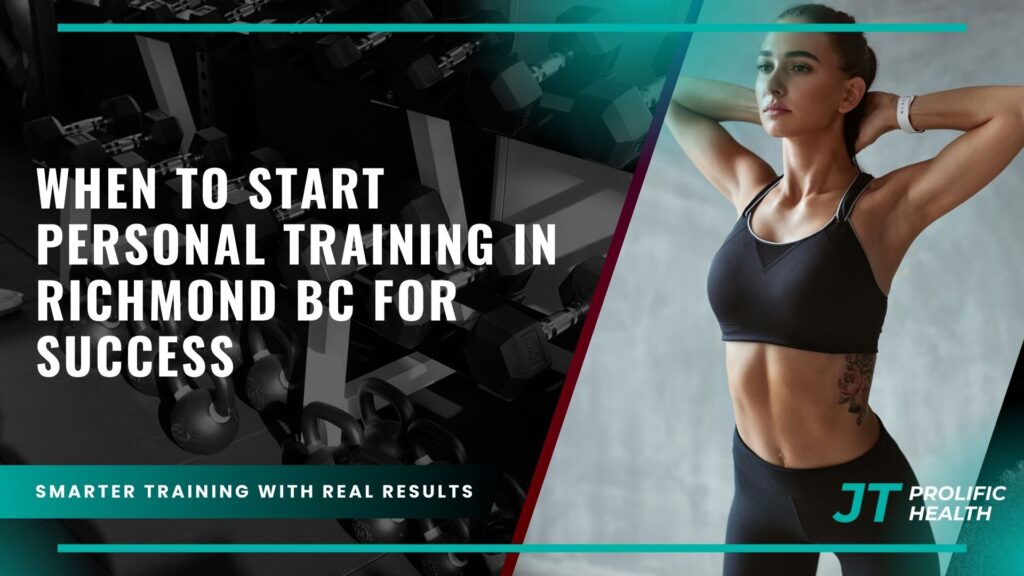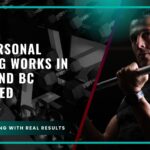Deciding when to start personal training can feel overwhelming, especially when you’re considering the investment in your health and fitness goals. In Richmond, BC, many residents find themselves asking this crucial question as they navigate their wellness journey. The truth is, there’s rarely a “perfect” time to begin, but there are certainly optimal moments when personal training can provide maximum benefit and set you up for long-term success.
Personal training represents more than just guided exercise sessions—it’s a comprehensive approach to transforming your relationship with fitness, nutrition, and overall well-being. Whether you’re a complete beginner stepping into a gym for the first time, someone returning to fitness after a long hiatus, or an experienced athlete looking to break through plateaus, the timing of when you start can significantly impact your results.
Richmond’s diverse community includes individuals at every stage of their fitness journey, from busy professionals juggling demanding schedules to retirees looking to maintain their independence and vitality. Each person’s circumstances are unique, but certain indicators consistently point toward the ideal time to begin working with a qualified personal trainer. Understanding these signals can help you make an informed decision that aligns with your goals, lifestyle, and readiness for change.
The decision to start personal training often stems from various motivations: health concerns raised by medical professionals, upcoming life events like weddings or vacations, New Year resolutions, or simply reaching a point where you’re tired of feeling disconnected from your body. Regardless of your specific catalyst, recognizing when you’re mentally and physically prepared to commit to the process is crucial for achieving sustainable results.
Many Richmond residents delay starting personal training because they believe they need to be “in shape” before working with a trainer, but this misconception can prevent people from accessing the very support they need most. Professional trainers are specifically trained to work with clients at all fitness levels, and starting from wherever you are—not where you think you should be—is often the most effective approach to creating lasting change.
Key Takeaways
- Start immediately after medical clearance: If your doctor has recommended exercise as part of a treatment plan or health improvement strategy, beginning personal training right away ensures you’re exercising safely and effectively under professional guidance.
- Begin during life transitions: Major life changes like career shifts, moving to Richmond, relationship changes, or reaching milestone birthdays often provide natural motivation and mental space for establishing new healthy habits.
- Launch when motivation peaks: Those moments when you feel genuinely excited about making changes—rather than just feeling guilty or pressured—represent optimal starting points for sustainable fitness transformations.
- Start before peak seasons: Beginning personal training 8-12 weeks before summer, wedding seasons, or vacation periods allows sufficient time to see meaningful results without the pressure of unrealistic timelines.
- Begin when you can commit consistently: The best time to start is when you can realistically maintain 2-3 sessions per week for at least 12 weeks, allowing your body and mind to adapt to new routines and see measurable progress.
- Start after establishing basic habits: While you don’t need to be fit to begin, having basic sleep and nutrition routines in place can amplify your training results and help you get more value from your investment.
- Begin when you’re ready to learn: Personal training involves acquiring new movement patterns, understanding your body’s responses, and developing long-term skills that extend far beyond individual workout sessions.
Understanding Your Readiness for Personal Training

Determining your readiness for personal training involves honest self-assessment across multiple dimensions of your life. Physical readiness doesn’t mean being in perfect shape—it means having medical clearance to exercise and being free from acute injuries or health conditions that would prevent safe participation in fitness activities. If you have chronic conditions like diabetes, heart disease, or arthritis, personal training can actually be incredibly beneficial, but you’ll want to ensure your trainer has experience working with your specific needs.
Mental readiness is equally important and often overlooked. This involves being in a headspace where you can receive feedback, learn new skills, and potentially challenge long-held beliefs about exercise and your capabilities. If you’re going through major stress, grief, or mental health challenges, it’s worth considering whether you have the emotional bandwidth to take on a new commitment. However, for many people, structured exercise with professional support can actually help manage stress and improve mental health.
Financial readiness means being able to commit to personal training without creating undue stress in other areas of your life. Quality personal training is an investment, and rushing into it without proper budgeting can create pressure that undermines your results. Consider not just the cost of sessions, but also any additional expenses like gym memberships, equipment, or nutritional supplements that might enhance your program.
Schedule readiness involves having realistic expectations about time commitment and being able to consistently attend sessions. Richmond’s traffic patterns, your work schedule, family obligations, and seasonal activities all factor into your ability to maintain consistency. The most effective personal training programs require regular attendance and practice outside of sessions, so ensuring you can realistically maintain this commitment is crucial for success.
Optimal Life Circumstances for Starting Personal Training


Certain life circumstances create particularly favorable conditions for beginning personal training. Career transitions, whether starting a new job, getting promoted, or changing fields entirely, often coincide with renewed focus on personal health and well-being. These periods typically involve reassessing priorities and establishing new routines, making it an ideal time to incorporate professional fitness guidance into your life.
Moving to Richmond presents another excellent opportunity to start personal training. Relocating naturally disrupts existing routines and creates space for establishing new, healthier habits. When you’re already adapting to a new environment, adding personal training to your routine feels less disruptive than trying to change established patterns. Additionally, working with a local trainer can help you discover Richmond’s fitness community and recreational opportunities.
Health scares or diagnoses often serve as powerful motivators for lifestyle changes. Whether it’s elevated blood pressure, pre-diabetes, or simply feeling winded climbing stairs, these wake-up calls can provide the motivation needed to commit fully to a fitness program. Personal trainers experienced in working with health conditions can help you navigate exercise safely while addressing your specific concerns.
Seasonal timing also plays a role in success rates. Many people find starting personal training in late winter or early spring aligns well with natural energy cycles and provides adequate time to see results before summer activities. Starting in fall can help establish routines that carry you through the challenging winter months when motivation typically wanes.
Life events like weddings, reunions, vacations, or milestone birthdays can provide external motivation, but the most successful clients are those who also have internal motivation for long-term health. Using events as catalysts is fine, but ensuring you’re also committed to ongoing wellness helps maintain results after the event passes.
For those interested in finding the right fitness professional, understanding your life circumstances helps trainers create programs that work with, rather than against, your current situation.
Physical and Mental Preparation Indicators


Recognizing when you’re physically and mentally prepared for personal training can significantly impact your success. Physical preparation doesn’t require being in excellent shape, but it does involve having a basic understanding of your body’s current capabilities and limitations. If you’ve been completely sedentary, starting with a few weeks of light walking or basic movement can help prepare your body for more structured training and reduce the risk of injury or overwhelming soreness.
Mental preparation involves developing realistic expectations about the process and timeline for results. Personal training is not a quick fix—it’s a journey that requires patience, consistency, and willingness to step outside your comfort zone. Being mentally prepared means understanding that progress isn’t always linear, that some sessions will be harder than others, and that developing new habits takes time and repetition.
Stress levels significantly impact your ability to benefit from personal training. While exercise can help manage stress, beginning an intensive training program during periods of extreme stress can sometimes feel overwhelming. Ideally, you want to start when you have enough mental bandwidth to focus on learning new movement patterns and implementing lifestyle changes that support your fitness goals.
Sleep quality and consistency provide important indicators of readiness. If you’re consistently getting less than six hours of sleep or dealing with significant sleep disruptions, addressing these issues before or alongside starting personal training will improve your results. Quality sleep is essential for recovery, energy, and the motivation needed to maintain consistent training.
Your relationship with food and eating patterns also influence training readiness. While you don’t need perfect nutrition to start personal training, being in a relatively stable place with your eating habits helps you better respond to nutritional guidance and fuel your workouts effectively. If you’re dealing with disordered eating patterns, addressing these concerns with appropriate professionals before beginning intensive training is often beneficial.
Understanding the importance of developing proper movement skills can help you appreciate why mental readiness to learn is so crucial for personal training success.
Seasonal Considerations for Richmond Residents
Richmond’s climate and seasonal patterns create unique considerations for when to start personal training. The Pacific Northwest’s wet winters can make outdoor exercise challenging, making it an ideal time to establish indoor fitness routines with professional guidance. Starting personal training in late fall or early winter allows you to build strength and conditioning that will enhance your enjoyment of outdoor activities when the weather improves.
Spring represents a natural time of renewal and growth, making it psychologically appealing for starting new fitness routines. The increasing daylight and milder temperatures can boost motivation and energy levels, creating favorable conditions for establishing new habits. However, spring is also when many people have the same idea, so booking with quality trainers may require advance planning.
Summer in Richmond offers excellent opportunities for outdoor activities, but it can also be a challenging time to start personal training if you’re already committed to vacations, family activities, and social events. If you do start training in summer, having a flexible trainer who can incorporate outdoor workouts or accommodate schedule changes becomes particularly valuable.
Fall often provides an ideal combination of stable weather, renewed focus after summer activities, and the motivation to establish healthy routines before the holiday season. Many Richmond residents find that starting personal training in September or October allows them to build momentum and healthy habits that help them navigate the challenges of holiday eating and reduced daylight hours.
Weather-related joint pain or seasonal affective disorder can also influence optimal timing. Some people find that starting personal training just before their typically challenging seasons helps them maintain better physical and mental health throughout those periods. Exercise has proven benefits for managing both joint health and mood disorders, making strategic timing particularly important for those dealing with these challenges.
Richmond’s proximity to mountains, ocean, and urban parks means that personal training can often incorporate seasonal activities. Starting training in advance of hiking season, skiing season, or beach activities allows you to build the specific strength and conditioning needed to fully enjoy these pursuits while reducing injury risk.
Goal-Setting and Timeline Considerations
The timing of when you start personal training should align with your specific goals and realistic timelines for achieving them. Weight loss goals typically require 12-16 weeks to see significant results, so working backward from target dates helps determine optimal start times. If you have a wedding in June, starting personal training in February or March provides adequate time for meaningful changes without the stress of unrealistic expectations.
Strength and conditioning goals often have different timelines. Building foundational strength and improving movement patterns can show initial results within 4-6 weeks, but developing significant strength gains typically requires 3-6 months of consistent training. Athletic performance goals may require even longer timelines, especially if you’re starting from a relatively sedentary baseline.
Health-related goals such as managing diabetes, reducing blood pressure, or improving cardiovascular health often show initial improvements within 4-8 weeks, but establishing long-term management strategies requires ongoing commitment. For health-focused training, the “best” time to start is usually as soon as possible after receiving medical clearance.
Lifestyle change goals—such as developing a sustainable exercise habit, improving energy levels, or enhancing overall quality of life—require the longest timelines but often provide the most lasting benefits. These goals are less about specific start dates and more about finding a time when you can commit to the process of gradual, sustainable change.
Setting both short-term and long-term goals helps maintain motivation throughout your personal training journey. Short-term goals might include attending all scheduled sessions for a month, learning proper form for basic exercises, or increasing workout frequency. Long-term goals often focus on larger lifestyle changes, performance improvements, or health outcomes.
For comprehensive support throughout your fitness journey, exploring professional guidance options can help you understand what to expect from the training process and how to set realistic timelines for your specific goals.
Prolific Health’s Approach to Timing and Readiness
At Prolific Health, we understand that the decision of when to start personal training is deeply personal and varies significantly among Richmond residents. Our approach focuses on meeting clients where they are, rather than waiting for them to reach some arbitrary level of “readiness.” We believe that the best time to start is when you feel motivated to make positive changes, have realistic expectations about the process, and can commit to consistency.
Our initial consultations help potential clients assess their readiness across multiple dimensions. We discuss not just fitness goals, but also lifestyle factors, stress levels, schedule constraints, and previous exercise experiences. This comprehensive assessment helps us determine whether someone is ready to begin immediately or if they might benefit from addressing certain factors first.
We work with clients to identify optimal timing based on their individual circumstances. For some, this means starting immediately to capitalize on current motivation. For others, it might mean planning a start date that aligns with schedule changes, seasonal preferences, or life events. Our flexible scheduling and program options accommodate various timing needs and preferences.
Prolific Health’s trainers are experienced in working with clients at all fitness levels and life stages. Whether you’re a complete beginner, returning to exercise after years away, or an experienced athlete seeking specialized guidance, we tailor our approach to your current abilities and goals. We don’t believe you need to be “in shape” to start—that’s exactly what we’re here to help you achieve.
Our programs are designed to build sustainable habits rather than just deliver short-term results. This means we focus on timing that supports long-term success rather than quick fixes. We help clients understand that consistency over time produces better results than intensive but unsustainable approaches.
For Richmond residents interested in professional strength training services, we offer comprehensive programs that can begin whenever you’re ready to commit to the process of positive change.
Frequently Asked Questions
Should I wait until I’m in better shape before starting personal training?
Absolutely not. Personal trainers are specifically trained to work with clients at all fitness levels, including complete beginners. Starting from wherever you are currently is not only acceptable but often more effective than trying to prepare on your own. Professional guidance from the beginning helps establish proper form, prevents injury, and creates sustainable habits.
Is January really the best time to start personal training?
While January is popular due to New Year motivation, the best time to start is when you personally feel ready and can commit consistently. January can be crowded and may not align with your individual circumstances. Consider your schedule, stress levels, and motivation patterns rather than following arbitrary calendar dates.
How long should I commit to personal training to see results?
Most clients begin seeing initial improvements within 4-6 weeks, but significant changes typically require 12-16 weeks of consistent training. We recommend committing to at least 3 months to allow your body to adapt and for new habits to become established. Long-term success often involves ongoing training or periodic check-ins.
Should I start personal training if I’m dealing with stress or major life changes?
This depends on the individual situation. Exercise can be an excellent stress management tool, but starting intensive training during overwhelming periods might add unwanted pressure. Discuss your circumstances with potential trainers to determine if a modified approach or delayed start might be more appropriate.
Can I start personal training if I have health conditions or injuries?
In most cases, yes, but you’ll need medical clearance and should work with trainers experienced in your specific conditions. Personal training can be particularly beneficial for managing health conditions, but safety requires proper professional guidance and communication with your healthcare providers.
How do I know if I’m mentally ready for personal training?
Mental readiness involves being open to learning, receiving feedback, and potentially challenging yourself. If you’re curious about fitness, willing to step outside your comfort zone, and can handle constructive guidance, you’re likely mentally ready. Perfect confidence isn’t required—just willingness to engage in the process.
Should I wait until my schedule becomes less busy?
For most people, schedules never become completely free. Instead of waiting for perfect timing, consider how personal training might actually help you manage stress and energy levels. Many clients find that regular exercise improves their productivity and stress management, making busy periods more manageable.
Is it better to start personal training before or after establishing other healthy habits?
Both approaches can work. Some people benefit from establishing basic sleep and nutrition routines first, while others find that personal training provides the structure and motivation needed to improve other health habits. Discuss your current habits and goals with potential trainers to determine the best approach for your situation.
Conclusion
Determining when to start personal training in Richmond, BC, ultimately comes down to aligning your motivation, circumstances, and commitment level with realistic goals and expectations. While there’s no universally perfect time to begin, the most successful clients are those who start when they feel genuinely motivated to make positive changes and can commit to consistency over the long term.
The key factors to consider include your physical and mental readiness, life circumstances, seasonal preferences, and specific goals. Rather than waiting for ideal conditions that may never arrive, focus on whether you can realistically commit to the process and are open to learning and growing throughout your fitness journey.
Remember that personal training is an investment in your long-term health and well-being, not just a short-term solution. The best time to start is often sooner than you think, provided you have realistic expectations and the support of qualified professionals who understand your unique needs and circumstances.
At Prolific Health, we’re committed to helping Richmond residents succeed regardless of when they choose to begin their fitness journey. Whether you’re ready to start immediately or need guidance in preparing for future training, professional support can help you make the most of your commitment to better health and fitness.




